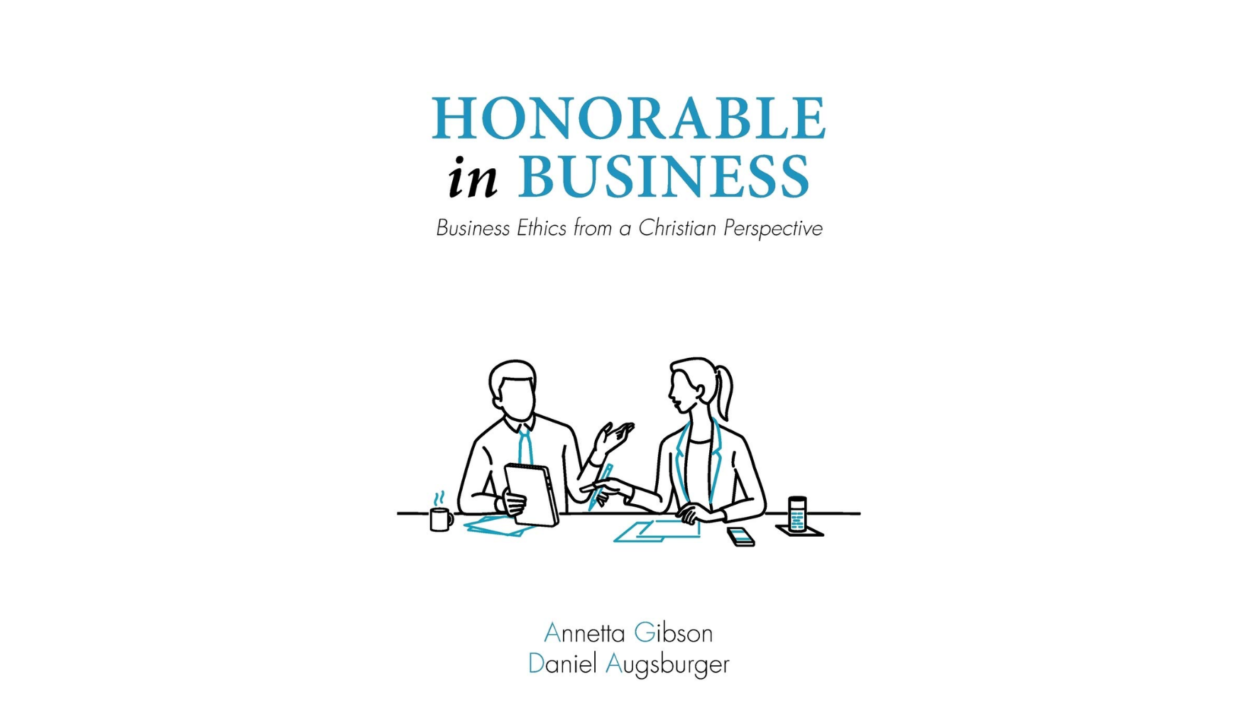By A. Gibson and D. Augsburger
Eugene, OR: Wipf and Stock Publishers (2019)
Paperback
Reviewed by DUANE COVRIG
Honorable Business is an excellent book on business ethics: readable, engaging, winsome, and sobering. The authors have woven material from the Bible and other Christian authors into a fascinating discussion of business ethics. They provide practical guidance along the way as they give rich spiritual and biblical texture to the topical issues discussed. I felt inspired throughout to embrace a strong Christian approach to business practices. Experienced business leaders and novices alike will welcome this book, and it is well worth its cost as a softback or an e-book. (I used both for this review.)
The authors are cautious about their book being used as a textbook for business ethics courses because it does not review large quantities of research and scholarship on each topic. Indeed, they cite little of the copious empirical and philosophical material in business ethics. However, I felt this was its main appeal as a core text for a Christian business ethics course in contrast to their caution. The clarity and “less than cluttered” approach to the topic may be helpful—especially for undergraduate business students. The authors keep the moral clarion call direct. In short, what it was lacking in reviewing copious material is made up for in streamlined clarity mixed with profound wisdom. Each chapter is insightful and encourages a moral approach to the topic in a way that in a deeply Christian way. Teachers could easily build around this core in their curriculum development.
Each chapter follows a simple but effective style. The authors start with an engaged “business” case and then circle back to the case while discussing a central topic in business ethics. They weave in Christian and biblical concepts while informing the topic and case.
For example, chapter one starts with an extensive discussion of the Walmart de Mexico bribery case, exposed by the New York Times in 2012. The authors then review theoretical and scholarly approaches to ethical decision-making (deontology, utilitarianism, etc.), including Christian and biblical concepts in both the case and decision-making processes. The result is a stronger reading experience that galvanizes the reader around Christian principles by connecting them to a real (in this chapter, sad) case.
Each chapter continues that trend. Chapter two, entitled “What Resources are Free for Business Use?” discusses environmental sustainability and was one of my favorites. It shared how the furniture company, Herman Miller, got into sustainable practices, then covers the ethical purposes of Christians doing business. The authors use colorful discussions of the Old Testament Torah and cite from many modern Christian business writers to give the reader strong evidence that God intended humans to use their creativity powers to steward the world. Rich. Wise. Honoring. And inspiring. After each chapter, I wondered why everyone would not want to do business from a Christian approach!
The rest of the book continues this trend. From ethical decision-making approaches (chap. 1) and the purpose of business and sustainability (chap 2), the authors move to employee rights (chap. 3), discrimination (chap. 4), product safety and quality (chap. 5), IT and privacy issues (chap. 6), marketing (chap. 7), whistleblowing (chap. 8) and accounting fraud (chap. 9), international challenges to business ethics (chap. 10), and the role of the Christian in the workplace (chap. 11). The authors also include an appendix, “Divine help for individuals seeking God in a sinful world,” which serves as a theological and devotional reminder of the basics of Christianity—revelation, prayer, church, etc.—and its role in centering our lives on God. Chapter 11, taken with this appendix, should be required readings in all Christian colleges seeking to create a strong moral character in their Christian professionals. I was inspired by these two chapters to deepen the moral preparation of the Christian students I work with in my university training. These will be useful in fields even outside of business—health, education, engineering, and more.
Those who want more details in an ethics book may want to check out other texts, including Craig Johnson’s classic Meeting the Ethical Challenge of Leadership (now in its 6th edition). That book is much larger and can provide a detailed review of much research. Coupled with Honorable in Business, Johnson’s book would make an excellent combination for business ethics and leadership ethics courses.
I believe this book creates an inspiring vision of doing business from a Christian framework. It also creates a joyful view of ethics. One is not left with the feeling we must be ethical because it is the Christian way but inspired by affirmative proof that individuals who bring their Christianity into business will see the power of doing business in a new and lively way. Businesses where love, mercy, and justice excel make business exciting and honorable and are sure to flourish.
We all need such a powerful reminder of the positivity of morality, especially in business. As such, I highly recommend this book.
DUANE COVRIG is a professor of Leadership and Ethics at Andrews University in Berrien Springs, MI.

